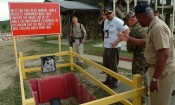
The story of Adnan Farhan Abdul Latif demonstrates the legal challenges associated with the detention center at Guantánamo Bay, Cuba, since 9/11. Latif was a Yemeni citizen who was captured in Afghanistan in late 2001 and sent to Guantánamo in January 2002. For years Latif argued that he was in Afghanistan to receive medical treatment for injuries he received in a car accident, but a military tribunal claimed he was an "enemy combatant" fighting with terrorist groups in Kabul. In 2004, the U.S. Supreme Court determined in Rasul v. Bush that detainees held at Guantánamo had the right to habeas corpus, which guarantees prisoners the ability to challenge the lawfulness of their imprisonment in court. Latif was one of the first detainees to file a habeas corpus petition that year.
In 2010, a U.S. District Court judge ordered Latif's release after reviewing his habeas petition. However, an appeal by the Justice Department the following year overturned that decision, and in the summer of 2012 the Supreme Court refused to hear his case. A frequent hunger striker, Latif was sometimes "placed on suicide watch and sent to the prison’s psychological ward," according to David Remes, one of his lawyers. Latif reflected on his experiences in a 2007 poem: “They leave us in prison for years ... because we are Muslims." On September 8, 2012, Latif died after more than ten years of detention at Guantánamo. He was never charged with a crime.
- Nick Sacco, Indiana University-Purdue University Indianapolis
In 2010, a U.S. District Court judge ordered Latif's release after reviewing his habeas petition. However, an appeal by the Justice Department the following year overturned that decision, and in the summer of 2012 the Supreme Court refused to hear his case. A frequent hunger striker, Latif was sometimes "placed on suicide watch and sent to the prison’s psychological ward," according to David Remes, one of his lawyers. Latif reflected on his experiences in a 2007 poem: “They leave us in prison for years ... because we are Muslims." On September 8, 2012, Latif died after more than ten years of detention at Guantánamo. He was never charged with a crime.
- Nick Sacco, Indiana University-Purdue University Indianapolis






